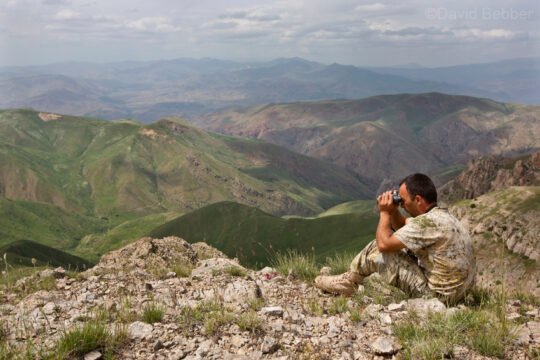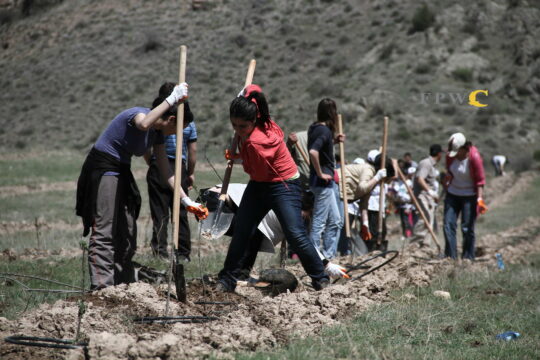Caucasus Wildlife Refuge
The overall objective of the Caucasus Wildlife Refuge (CWR) is to protect threatened species in Armenia and improve the conservation status of previously unsustainably managed land.
This area of over 26,300 ha (65,000 acres) has remarkable biodiversity such as Bezoar Goat, Mouflon, Bearded Vulture and the Caucasian Leopard, however, it is under threat of degradation due to unsustainable farming practices and illegal hunting.
With WLT support, FPWC is leasing land from rural communities to create the CWR and ensure protection of this privately managed conservation area by employing a team of rangers. In turn, these lease payments provide an income to communities for village improvements.
With additional WLT support, FPWC is developing and promoting ecotourism in and around the CWR to generate an additional income source to support conservation.
Temperate Grasslands, Savannas and Shrublands
Eastern Anatolian montane steppe
There are four main habitat types: wooded steppe, grassland (alpine, sub-alpine and boreal), semi-desert and rivers and streams
Land leases and reserve management
The Caucasus is home to more than 150 species of mammals, 44 of which are found in and around the CWR.
Rare species include Armenian Mouflon (endangered subspecies), Syrian Brown Bear, Bezoar Goat, and Grey Wolf. In 2013 it was confirmed that Caucasian Leopards also use the reserve.
150 bird species have been recorded in the CWR including the Caspian Snowcock listed as Vulnerable in Armenia and the European Roller, also listed in the Red Data book of Armenia. The reserve is home to all four vulture species in Armenia; Griffon, Cinereous, Bearded and Egyptian Vultures, the latter of which is Endangered.
Armenia also holds a high diversity of plants with 7,500 species, of which 35 per cent are endemic. Reptiles of note include the Armenian Viper.
The Caucasus Wildlife Refuge is an important part of the Caucasus Biodiversity Hotspot, one of the 35 most biologically rich regions on earth.
Leased areas within the Caucasus Wildlife Refuge fall within the Khosrov Forest and Noravank Important Bird Areas (IBAs) and border the Gndasar IBA.

Uncontrolled hunting and poaching is a serious issue throughout Armenia, where killing extremely rare species bolsters standing with the community, while also fetching a high price on the black market.
Degradation and destruction of wildlife habitat is caused by illegal logging, unsustainable plant gathering and overgrazing, as well as from human-induced wildfires that are a major threat to the Caucasus Wildlife Refuge.

FPWC have a number of environmental education programmes including the environmental film festival.
Additional support to community development projects is provided under the ecovillages network and FPWC also run a wildlife rescue and rehabilitation centre, based in the CWR to rescue many of the country’s captive brown bears.